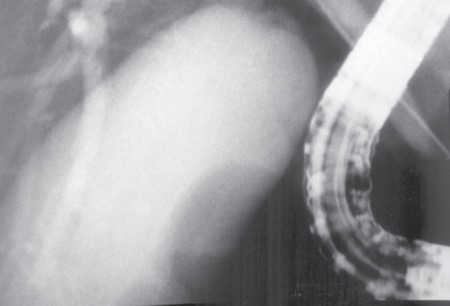SAN DIEGO—Minor papilla sphincterotomy intervention does not help prevent recurrent pancreatitis in patients with pancreas divisum, according to the results of a new randomized controlled study.
Most people with pancreas divisum (PD), which affects about 5% to 10% of people worldwide, have no issues, noted Vivek Kaul, MD, the Segal-Watson Professor of Medicine in the Division of Gastroenterology and Hepatology at the University of Rochester Medical Center, in New York. When patients with PD have a history of recurrent acute pancreatitis, there can be concern that PD is the culprit.
Endoscopic retrograde cholangiopancreatography with a sphincterotomy has had mixed results in this setting, Dr. Kaul said. Many patients who undergo this intervention still have recurrent pancreatitis, which puts the benefit of undergoing the procedure at all into question. “This has always come under a cloud, and it remains controversial whether or not we should offer ERCP for this patient population,” he said.
In the new SHARP (SpHincterotomy for Acute Recurrent Pancreatitis) trial, investigators led by Gregory Coté, MD, MS, a professor and the head of the Division of Gastroenterology and Hepatology at Oregon Health and Science University, in Portland, aimed to measure whether a sphincterotomy of the minor papilla relieved symptoms or prevented recurrence of acute pancreatitis more than 30 days after study randomization.
Presenting the study at DDW 2025, Dr. Coté noted that patients qualified for enrollment if they had more than two episodes of acute pancreatitis and PD confirmed by magnetic resonance cholangiopancreatography. The participants were placed into one of three groups: 1) patients who refused randomization or having an ERCP and served as an observational cohort (n=33); the remaining patients underwent endoscopic ultrasound and were randomized to 2) ERCP and minor papillotomy (n=75) or 3) a sham ERCP (n=73). Randomization was stratified by episode frequency and pancreatic duct size because the researchers thought these parameters could indicate a higher chance of benefiting from the procedure.
{RELATED-VERTICAL}The researchers found that across all three groups, recurrent pancreatitis after the procedure was common 30 days after randomization: 26 of 75 patients (34.7%) in the minor papillotomy group and 32 of 73 patients (43.8%) in the sham group, for an adjusted risk difference of –9.2% (95% CI, –24.8% to 6.5%) for the intervention.
In further analyses, there was no evidence of a benefit from ERCP with minor papilla sphincterotomy for other outcome measures, such as episode frequency (defined by an incidence rate ratio), chronic pancreatitis, exocrine pancreatic dysfunction or adverse events that required hospitalization.
“There is no benefit of papillotomy,” Dr. Coté said. “To cut to the chase here, we basically saw no indication of any factors that were associated with a higher likelihood of response—age, sex, diabetes, ... duct diameter. We had 21 patients that had a duct that was larger than 4 mm, and 18 patients with the Santorini seal. ... These, again, didn’t seem to correlate with a higher chance of response [to ERCP],” he said. “In aggregate, it was clear that patients with pancreas divisum alone, with otherwise unexplained acute recurrent pancreatitis, did not improve after undergoing ERCP with minor papillotomy.”
These results, Dr. Kaul said, are highly valuable because they will change how pancreatic specialists treat patients with this anatomic variation in the future. Until now, there were no high-quality, randomized controlled studies that looked at the efficacy of ERCP for this patient population and measured its efficacy against no intervention, he said. These results are “a step [toward] not doing it anymore. ... We did not have this data before when faced with making a decision to perform ERCP in this patient population.”
Pancreatic specialists are accustomed to offering ERCP to patients with pancreatitis and PD, Dr. Kaul said, so a dramatic practice change likely will not happen overnight. But these findings should “give people significant pause” on moving forward with ERCP for PD.
—Karen Fischer
Drs. Coté and Kaul reported no relevant financial disclosures. Dr. Kaul is a member of the Gastroenterology & Endoscopy News editorial board.

